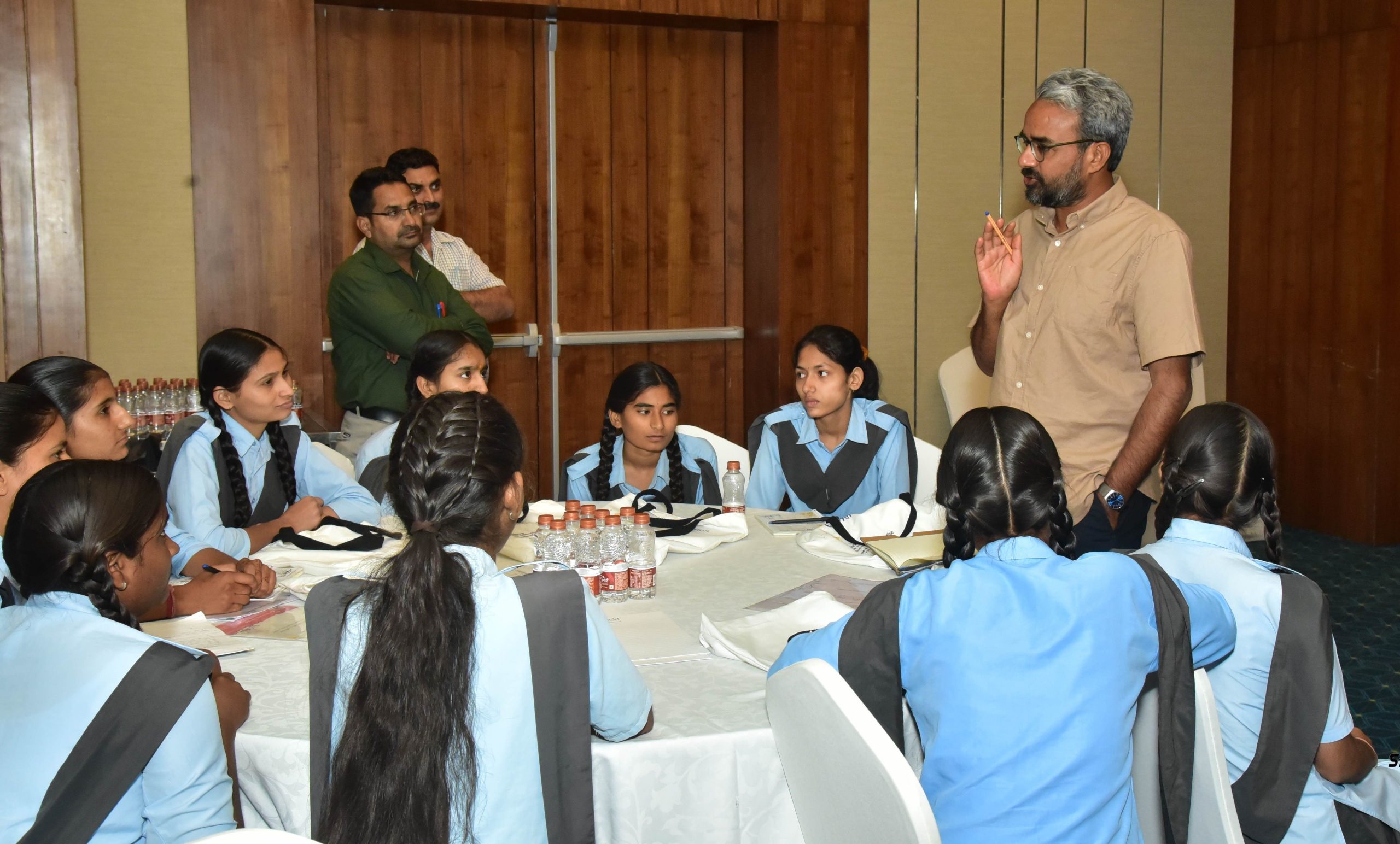Voices from the Sylff Community
Higher education is a distant dream for many students in rural India owing to limited resources and cultural barriers. In May 2024, Khinvraj Jangid (Jawaharlal Nehru University, 2009–11) hosted an SLI workshop in his hometown of Jodhpur to share insights on the paths local students can take to pursue their aspirations.
* * *
Education remains an elusive privilege for millions residing in rural India, where access to quality schooling is constrained by systemic inequities. Successfully completing basic education often hinges on fortuitous circumstances, which in turn influence prospects for higher education, gainful employment, and economic self-reliance.
With approximately 65% of India’s population living in rural areas and 47% reliant on agriculture for subsistence, the youth in these regions grapple with formidable socioeconomic challenges. Their aspirations frequently confront structural limitations, beginning with underfunded village schools administered by government bodies struggling to allocate adequate resources.
Indian governments have historically faced the herculean task of addressing fundamental needs, such as livelihood generation, housing, water and sanitation, transportation, electricity, and healthcare. Under Prime Minister Narendra Modi, the government has made significant strides, such as by constructing over 100 million toilets in rural areas since 2014 and providing more than 100 million cooking gas cylinders to rural households to alleviate health risks from wood-burning stoves.
While laudable, these initiatives underscore the stark developmental gaps that define rural India.
“What Will Education Achieve?”
In this context, rural childhoods are often bereft of libraries, books, arts and crafts, stationery, or literature. Yet, despite these deficiencies, the intellectual curiosity and aspirations of rural youth remain resilient, frequently outstripping the limited resources available in their schools.
The absence of meaningful infrastructural and pedagogical support often results in a stifled potential that remains unfulfilled unless external interventions—mentors, scholarships, or access to facilities—become available.
As someone born and raised in a rural village in Rajasthan, I was fortunate to encounter inspirational educators and to access a library outside my village, which enabled me to transcend the constraints of my immediate environment. Such experiences highlight the transformative power of even modest interventions, which can help break the cycles of poverty and stagnation that characterize rural life.
For most rural youth, though, the transition from school to life beyond often represents uncharted terrain. Many adults in these communities do not pursue education beyond high school due to the prohibitive costs and geographical inaccessibility of colleges. Even those who manage to attend often return disillusioned when their academic qualifications fail to translate into employment opportunities, reinforcing the pervasive skepticism encapsulated in the phrase, padhne se hoga kya (what will education achieve?).
This sentiment, prevalent when I was a student three decades ago, remains deeply entrenched today. The disconnect between higher education and employment is exemplified by the alarming case in 2018, when tens of thousands of overqualified individuals—holding PhDs and master’s and bachelor’s degrees—applied for peon positions in Uttar Pradesh, a role requiring only a fifth-grade education. These cases reflect not only the dearth of quality job opportunities but also the systemic inefficiencies in linking education with skill development and labor market needs.
While some individuals achieve success through self-motivation, perseverance, and familial financial support, they are often regarded as anomalies, unattainable exemplars for the majority lacking comparable resources or mentorship.
Persistent Sense of Inferiority
The transition from rural to urban spaces involves not only academic challenges but also cultural and social adaptation. Rural students must navigate the complexities of competition, meritocracy, and the academic rigor demanded by city-based institutions, while simultaneously contending with the cultural dissonance of urban life.
This adjustment encompasses language barriers, behavioral norms, and societal expectations, all of which can profoundly influence a student’s academic trajectory. The inadequacies of village schools in preparing students for such transitions are particularly pronounced with regard to the English language, which dominates as the medium of instruction in reputable institutions.
For rural students, English is often a foreign tongue, absent from their households, neighborhoods, and schools, resulting in acute underconfidence and a persistent sense of inferiority. The lack of early exposure to English not only hampers their academic performance but also perpetuates a sense of social exclusion, as they struggle to communicate effectively in environments dominated by urban and cosmopolitan peers.
While acquiring proficiency in English is feasible, the interim period is fraught with challenges, as rural students find themselves at a disadvantage compared to their urban peers, who possess linguistic fluency and cultural capital.
Need for Institutional Support Mechanisms
This disparity frequently engenders a sense of alienation among rural students in urban educational settings, spaces they perceive as gateways to a brighter future. Coping with this alienation often entails enduring loneliness as they strive to form connections with peers whose backgrounds and experiences differ markedly from their own.
The psychological toll of this transition is compounded by the constant pressure to adapt quickly, a task made more difficult by the absence of institutional support mechanisms that could facilitate smoother integration. For instance, mentorship programs, bridge courses, or targeted language training could significantly alleviate these challenges, but such interventions remain sporadic and underfunded.
It was to provide such intervention that I organized the workshop “Life after School for the Rural Youth of Jodhpur” as a Sylff Leadership Initiative in May 2024. The workshop aimed at providing information, inspiration, and assistance to enable the rural youth of Jodhpur, India, to move on to higher education.
Specifically, the agenda included (a) addressing the aspirations and fears of the village youth about higher education, (b) identifying essential skills (such as reading, writing, and speaking), (c) highlighting the critical role of the English language in higher education, and (d) cultivating emotional intelligence and self-awareness with the help of life coaches.

The author discusses higher education opportunities with participants of the May 2024 workshop in Jodhpur, India.
Forty high school students participated, a majority of them girls. The results of this workshop were extraordinary and rewarding for them. It was the first of its kind for their parents as well, who joined the orientation and concluding sessions and committed to supporting the education of their daughters and sons upon learning, through the workshop, that there are plenty of accessible opportunities—something that they knew little about before.
Participating in workshops, summer schools, and short seminars before completion of one’s schooling can be life-changing experiences. All the students were grateful for such an experience and for the many takeaways, including new insights into how to pursue a subject, what is crucial in language skills, how to work on personality development, and interpersonal skills.
Surmounting Structural Inequalities
Despite the challenges they face, many rural students demonstrate remarkable resilience and adaptability. Their journeys often exemplify the interplay of determination, resourcefulness, and external support. The process of overcoming these barriers demands resilience and determination, driven by the aspiration to attain personal growth and socioeconomic stability. For rural youth, education represents both a pathway to opportunity and a stark reflection of the structural inequalities they must surmount to succeed in a rapidly evolving India.
However, for education to truly serve as a vehicle for empowerment, systemic reforms are imperative. These include enhanced investment in rural schools, targeted mentorship programs, and robust policies that bridge the gap between education and employment. Only then can the potential of rural youth be fully realized, transforming not only their lives but also the socioeconomic landscape of India.
